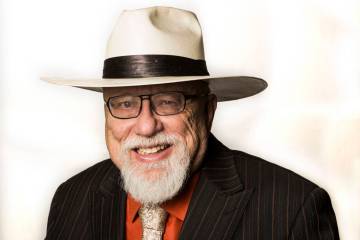Living in the shadows is a nightmare for Las Vegas mother, daughters
Unless you have a heart of stone, you can’t help but be moved by 29-year-old Karina Garcia’s situation.
The petite, married mother of three children — all born in Las Vegas — was just 2 years old when her parents, hoping for a better life than the grinding poverty they experienced in Mexico, found a way to sneak into the United States.
It wasn’t until she was 16 that Garcia — whose first language is English, who enjoyed July Fourth more than any other holiday, whose younger siblings were born in the United States — learned she was born south of the border and in the country illegally.
She had applied for a job at McDonald’s when she found out she needed a Social Security card. When she went home to get it, her mother told her she didn’t have one.
She also told her why.
“It was a nightmare, gut-wrenching,” she says as we sit in the law office of immigration lawyer Juan J. de Pedro, an attorney with the De Castroverde Law Group in Las Vegas. “I was devastated.”
For years she has tried unsuccessfully to navigate immigration policies that would allow her to live and work here legally.
Garcia turned up recently at de Pedro’s office seeking advice after a U.S. Supreme Court ruling killed President Barack Obama’s plan to defer deportation and provide work authorization for some illegal immigrants. She had believed the plan, called the Deferred Action for Parental Accountability, gave her the best chance to stop worrying about immigration authorities taking her away from her children.
Under the plan’s guidelines, illegal immigrants who had lived in the United States since 2010 and had children who were citizens were eligible for a three-year, renewable work permit and exemption from deportation.
“I saw it as a way for me to stop living as a ghost,” she says. “Right now I’m here but I don’t count. … But even if I don’t count, I won’t let anybody take me away from my children. … Every time I hear the doorbell, I think it might be somebody coming for me. I’m always looking over my shoulder. It’s a horrible way to live.”
As Garcia talks, her well-behaved 8- and 9-year-old daughters, who sit behind her, show signs of stress as worry lines pop out on their foreheads. Their little brother is staying with friends.
Under the law, Garcia’s siblings can petition for her to be here legally, but de Pedro says it would take up to 20 years for that to take place. Her native-born children can’t petition for legal status for their mother until they reach age 21.
De Pedro explains that Garcia’s best chance for legal status now is under the Deferred Action for Childhood Arrivals immigration policy. It allows certain illegal and undocumented immigrants who entered the country before their 16th birthday and before June 2007 to receive a renewable two-year work permit and exemption from deportation.
Garcia’s husband is currently working legally as a cook under that policy.
While it appears Garcia could fit the policy requirements, she was a stay-at-home mom for four years between 2007 and 2016, so she doesn’t have much documentation to show she has lived in the country continuously for the last nine years.
Years of rent receipts and utility bills are in her husband’s name. She worked in sales, but she had to do so off the books. She needs enough medical records, school records, dated pictures and affidavits to satisfy authorities.
“It would have been so much easier for me to get the three years of documentation needed for DAPA,” she says.
Because Garcia’s husband is a DACA beneficiary, he cannot petition for legal status for his wife. Though her parents are permanent residents — they have green cards — they cannot petition for legal status for children who are married.
“I want to officially become what I am — an American,” Garcia says. “I have no family in Mexico. If I’m deported there, I’ll know no one. I’m so American I tried to sign up for the Army to fight terrorism, but I couldn’t without a green card.”
Paul Harasim’s column runs Sunday, Tuesday and Friday in the Nevada section and Thursday in the Life section. Contact him at pharasim@reviewjournal.com or 702-387-5273. Follow @paulharasim on Twitter.






















